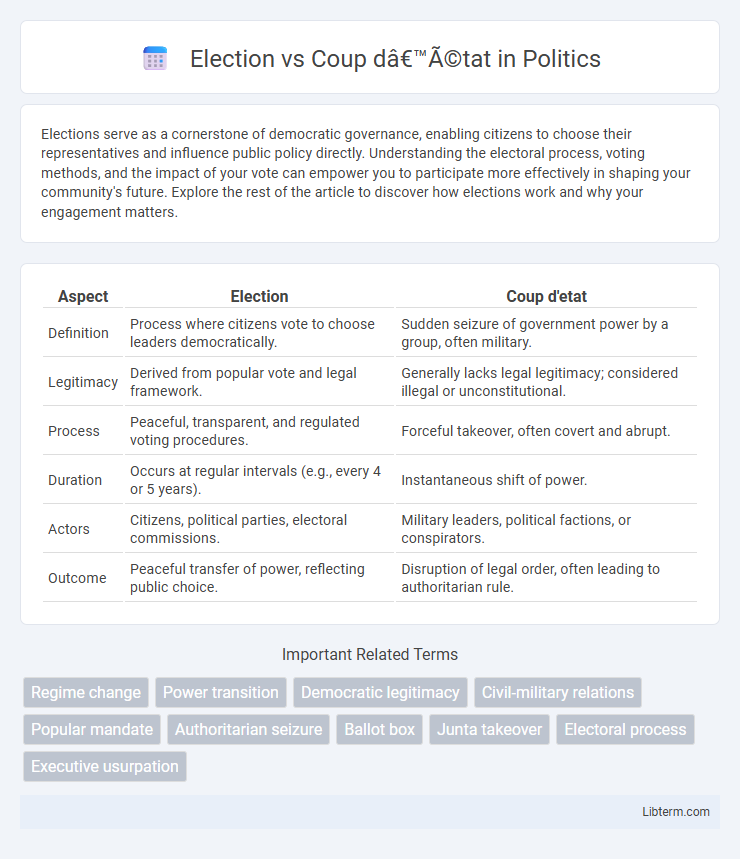Elections serve as a cornerstone of democratic governance, enabling citizens to choose their representatives and influence public policy directly. Understanding the electoral process, voting methods, and the impact of your vote can empower you to participate more effectively in shaping your community's future. Explore the rest of the article to discover how elections work and why your engagement matters.
Table of Comparison
| Aspect | Election | Coup d'etat |
|---|---|---|
| Definition | Process where citizens vote to choose leaders democratically. | Sudden seizure of government power by a group, often military. |
| Legitimacy | Derived from popular vote and legal framework. | Generally lacks legal legitimacy; considered illegal or unconstitutional. |
| Process | Peaceful, transparent, and regulated voting procedures. | Forceful takeover, often covert and abrupt. |
| Duration | Occurs at regular intervals (e.g., every 4 or 5 years). | Instantaneous shift of power. |
| Actors | Citizens, political parties, electoral commissions. | Military leaders, political factions, or conspirators. |
| Outcome | Peaceful transfer of power, reflecting public choice. | Disruption of legal order, often leading to authoritarian rule. |
Definition of Election
An election is a formal process in which eligible citizens vote to choose representatives or decide on policies, ensuring government legitimacy through democratic participation. It involves transparent procedures, legal frameworks, and equal voting rights to reflect the will of the people. Elections differ fundamentally from coups d'etat, which are abrupt, illegal seizures of power bypassing democratic mechanisms.
Understanding Coup d’État
A coup d'etat is a sudden, illegal seizure of government power typically executed by a small group, often military leaders, bypassing established democratic processes such as elections. Unlike elections that ensure a peaceful transfer of power through voter participation and constitutional procedures, coups disrupt political stability by using force or intimidation to overthrow existing authorities. Understanding the mechanisms, motivations, and consequences of a coup d'etat is crucial for analyzing threats to democratic institutions and governance worldwide.
Key Differences Between Elections and Coups
Elections are democratic processes where citizens vote to choose their leaders through transparent, legal frameworks that uphold political legitimacy and public consent. Coups d'etat involve the sudden, often violent overthrow of a government by military or political factions, bypassing legal procedures and disregarding voter participation. The key differences lie in legitimacy, method of power transition, and respect for constitutional order.
Historical Examples of Elections
Historical examples of elections demonstrate peaceful transitions of power through democratic processes, such as the 1960 U.S. presidential election where John F. Kennedy was elected, reflecting popular sovereignty. The 1994 South African general election ended apartheid and marked a historic moment with Nelson Mandela becoming the first Black president, showcasing democratic inclusion. These elections contrast sharply with coups d'etat like the 1973 Chilean military coup, where power was seized by force, undermining electoral legitimacy.
Notable Coup d’État Events
Notable coup d'etat events include the 1973 Chilean coup led by General Augusto Pinochet, overthrowing President Salvador Allende, and the 1991 Soviet coup attempt aimed at reversing Mikhail Gorbachev's reforms. The 2013 Egyptian coup resulted in the military ousting President Mohamed Morsi amid mass protests, while the 2016 Turkish coup attempt sought to depose President Recep Tayyip Erdogan but ultimately failed. These events contrast sharply with democratic elections, which involve peaceful and institutional transfer of power based on popular vote and constitutional legitimacy.
Impact on Political Stability
Elections promote political stability by enabling peaceful power transitions through democratic processes, reflecting citizens' will and enhancing governmental legitimacy. Coups d'etat disrupt political stability by forcibly overthrowing established institutions, often leading to violence, authoritarian rule, and prolonged instability. The contrast in these mechanisms significantly influences a country's governance, public trust, and international relations.
Legitimacy and Public Perception
Elections confer legitimacy through popular mandate, reflecting the collective will of citizens as expressed via free and fair voting processes recognized by legal frameworks. In contrast, a coup d'etat seizes power abruptly, bypassing established laws and often triggering public skepticism or unrest due to perceived illegitimacy. Public perception hinges on transparency and consent, with elections fostering trust in governance, whereas coups provoke uncertainty and potential resistance.
International Response and Influence
International response to elections often includes widespread recognition and support from diplomatic entities such as the United Nations and regional organizations like the African Union or the European Union, emphasizing legitimacy and sovereignty. In contrast, coups d'etat typically provoke condemnation, sanctions, and isolation from the international community due to their disruption of constitutional order and threats to regional stability. Influence on international relations varies significantly, as elections facilitate cooperation and aid, while coups trigger diplomatic tensions, economic restrictions, and potential intervention.
Consequences for Governance and Society
Elections establish legitimate governance through popular consent, promoting political stability, accountability, and long-term societal trust. Conversely, a coup d'etat often results in abrupt power shifts, eroding legal frameworks, inciting unrest, and undermining institutional integrity. The aftermath of coups typically features weakened democratic norms, increased authoritarianism, and potential human rights violations.
Preventing Coups and Strengthening Electoral Processes
Promoting transparent electoral systems with independent oversight bodies significantly reduces the risk of coups d'etat by ensuring the legitimacy of election outcomes. Implementing robust voter education campaigns and secure voting technologies strengthens public trust in democratic processes and deters unconstitutional power seizures. International monitoring and legal frameworks further safeguard elections, making coup attempts increasingly difficult and less justifiable.
Election Infographic

 libterm.com
libterm.com